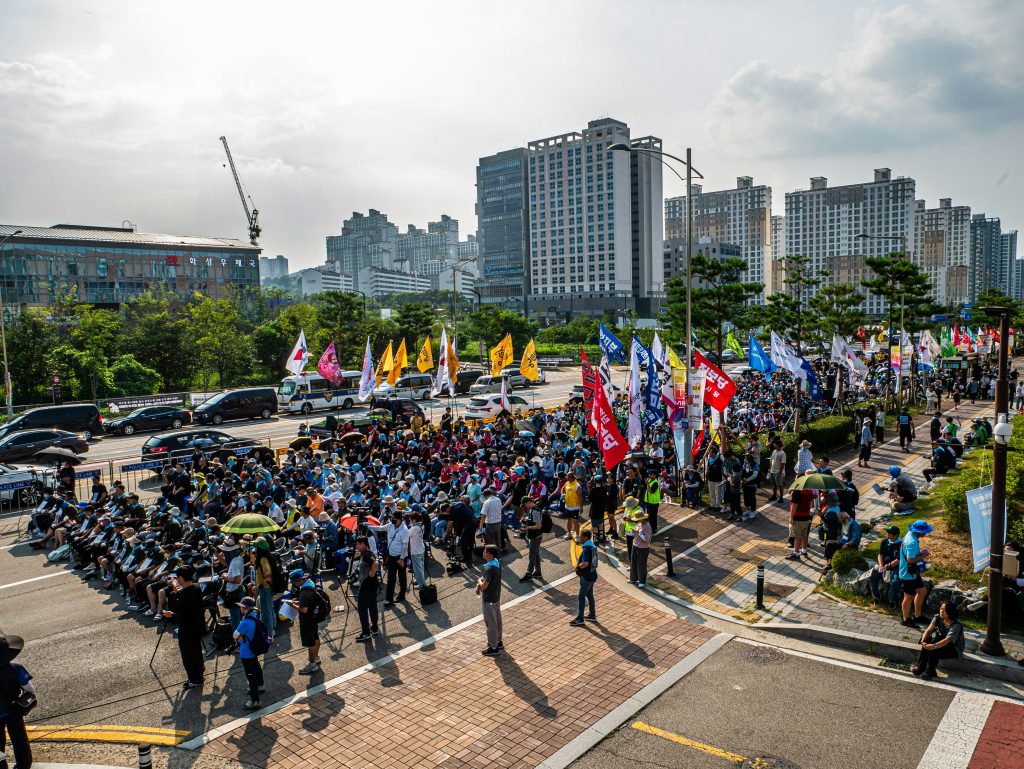Teamsters Union Declines to Endorse Presidential Candidates, Shifting Labor Dynamics
In a surprising move that has sent ripples through the political landscape, the International Brotherhood of Teamsters, one of the most influential labor unions in the United States, has announced that it will not endorse any candidate in the upcoming presidential election. This decision marks a significant departure from the traditional role labor unions have played in U.S. elections, where endorsements are often seen as a key to mobilizing the working-class vote.
The Teamsters’ General Executive Board made this announcement following internal polling that revealed a lack of commitment from both leading candidates—former President Donald Trump and current Vice President Kamala Harris—on issues that are critical to Teamsters members. The union expressed concerns that neither candidate adequately addressed key issues such as labor rights, wage growth, and job security, which are paramount to the union’s members.
The Teamsters’ decision not to endorse candidates could reshape electoral dynamics, particularly in battleground states where the union has historically wielded considerable influence. With the union representing a significant number of workers in industries such as transportation and logistics, the lack of a clear endorsement may hinder the mobilization of their membership during the election.
While other unions have rallied behind candidates, the Teamsters’ choice to remain neutral illustrates a growing disconnection between labor organizations and the current political candidates. This could lead to a reassessment of how labor unions engage with political processes moving forward. The Teamsters have emphasized the need for candidates to prioritize working-class issues and demonstrate genuine commitment to labor interests before receiving their endorsement.
The announcement has sparked conversations among union leaders and members alike, with some expressing disappointment over the lack of a unified front in such a crucial election cycle. Others see this as an opportunity for the Teamsters to reassess their political strategy and focus on grassroots mobilization rather than relying on endorsements.
As the election approaches, the implications of the Teamsters’ decision may extend beyond just this election cycle. It raises questions about the future role of labor unions in politics and whether they can adapt to the changing political landscape while still advocating for the rights and needs of their members.
With the political environment becoming increasingly polarized, the Teamsters’ decision could serve as a wake-up call for candidates who may take union support for granted. The union’s leadership has stated that they will continue to advocate for labor rights and working-class issues, regardless of who occupies the White House in the future.
In conclusion, the Teamsters’ choice to forgo an endorsement this election cycle is a significant moment in the labor movement. It reflects a broader trend of disillusionment among unions about the political process and the need for candidates to earn their support through meaningful commitments to labor issues. As the political landscape evolves, the Teamsters may pave the way for a new approach to union involvement in politics, one that prioritizes the voices of their members and the issues that matter most to working Americans.
Tags: Labor Union, Teamsters, Teamsters endorsement
UAW President Shawn Fain Takes Center Stage at DNC, Criticizes Trump and Champions Union Support
In a powerful display of solidarity and political fervor, United Auto Workers (UAW) President Shawn Fain made headlines at the Democratic National Convention, held in Chicago. Fain’s presence was not merely ceremonial; it was a clarion call for union support and a fierce denunciation of former President Donald Trump. Addressing an audience of Democrats and labor supporters, Fain emphasized the importance of unions in elevating the voices of working-class individuals, asserting that Vice President Kamala Harris would be a staunch ally for labor rights.
Fain’s rhetoric was sharp and unyielding, as he labeled Trump a ‘scab’—a term traditionally used to describe workers who cross picket lines during strikes. This provocative language underscored Fain’s commitment to holding political figures accountable for their actions in relation to labor rights. Throughout the 2024 election cycle, Fain has consistently used this terminology to draw stark contrasts between the interests of labor and the agendas of what he describes as the ‘billionaire class.’
The UAW leader’s address resonated with many in attendance, as he connected the dots between union strength and the broader political landscape. He articulated how the rights of workers are intrinsically linked to the health of democracy, urging attendees to consider their votes carefully in the upcoming elections.
Fain’s speech was not just a diatribe against Trump; it was a rallying cry for workers everywhere. He positioned the UAW not only as a labor organization but as a powerful political force that can influence the direction of policy and governance. The call to action was clear: the labor movement must unite to ensure that the voices of workers are heard and prioritized in the political arena.
As the Democratic National Convention progresses, Fain’s remarks will likely serve as a touchstone for discussions around labor rights, economic justice, and the role of unions in contemporary politics. His ability to galvanize support among Democrats and labor advocates alike highlights the growing intersection of labor issues within the broader political narrative leading into the election year.
With the stakes higher than ever, Fain’s leadership and the UAW’s active engagement in the political process signal a renewed commitment to fighting for the rights of workers and ensuring that their interests are front and center in the national conversation. The UAW’s stance against Trump and his associates, whom Fain referred to as ‘lap dogs for the billionaire class,’ reflects a growing discontent with the status quo and a demand for a more equitable economic system.
As the convention unfolds, Fain’s words will undoubtedly resonate with many voters who are seeking change and a reaffirmation of their rights as workers. The UAW’s mobilization efforts, combined with Fain’s fiery rhetoric, suggest that labor will play a crucial role in shaping the outcome of the 2024 elections. The question now remains: will the Democratic Party rise to the occasion and embrace the labor movement in a way that honors the struggles of working-class individuals across the nation?
Tags: Democratic National Convention, Donald Trump, Kamala Harris, Labor Rights, Shawn Fain, UAW
UAW President Calls Out Trump as a ‘Scab’ at DNC, Igniting Social Media Debate
In a significant moment during his address at the Democratic National Convention, United Auto Workers (UAW) President Shawn Fain made headlines by labeling former President Donald Trump a ‘scab.’ This term, typically used to describe workers who cross picket lines during strikes, has sparked a heated discussion across social media platforms. Fain’s remarks resonated particularly within the labor community, reflecting the ongoing tensions between union members and those perceived as undermining their efforts.
Wearing a shirt emblazoned with the term, Fain emphasized the importance of solidarity among workers, particularly in states that have historically supported the Democratic Party, often referred to as the ‘blue wall’ states, including Michigan and Pennsylvania. His strong words about Trump being a ‘scab’ were not just a personal attack but a broader commentary on the former president’s policies and actions that many union members believe have harmed their interests.
Fain also praised current Vice President Kamala Harris as a ‘fighter’ for the working class, contrasting her dedication to labor rights with Trump’s record. The UAW, which boasts over a million active and retired members, is at the forefront of labor rights discussions, especially as the automotive industry faces critical changes and challenges, including the push towards electric vehicles and the implications for jobs.
The debate around the term ‘scab’ has historical roots in labor movements, where crossing picket lines is viewed as betrayal to fellow workers. Fain’s usage of this term highlights the deep-seated frustrations that many union workers feel towards those they believe do not support their rights and livelihoods. As the conversation continues to unfold online, it has opened a dialogue about the role of unions in the modern workforce and the ongoing struggle for worker rights in the face of political opposition.
As the DNC progresses and the 2024 elections loom, the intersection of labor issues and political rhetoric will undoubtedly remain a focal point for both parties. Fain’s remarks have not only invigorated supporters but also reignited discussions about the labor movement’s future and its impact on American politics.
In summary, Shawn Fain’s bold statement at the DNC has reverberated through social media and labor communities, serving as a reminder of the critical role unions play in advocating for workers’ rights and the challenges they face from political figures who may undermine those efforts. As the UAW continues to navigate this complex landscape, the implications of these discussions will likely shape the narrative leading up to the next presidential election and beyond.
Tags: DNC, Donald Trump, Labor Rights, Scab, UAW


